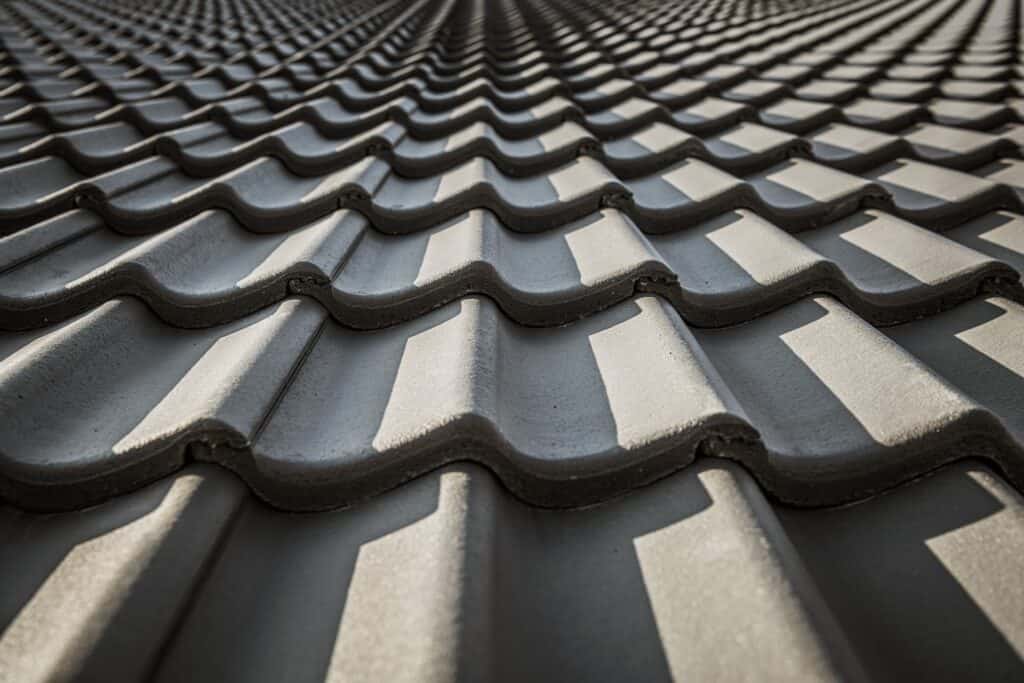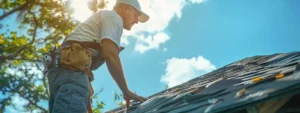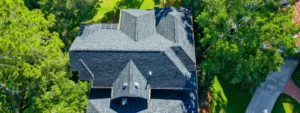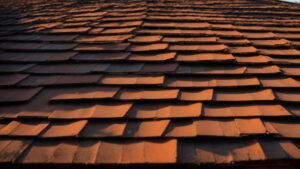In the Sunshine State, the longevity of a roof is a topic of great interest.
Florida’s unique climate presents a challenge to homeowners, real estate investors, and construction professionals alike.
Understanding the lifespan of a new roof in this environment is crucial. It helps in making informed decisions about roof care, maintenance, and material selection.
This article delves into the factors that affect roof longevity in Florida. From the impact of harsh weather conditions to the role of proper installation and regular maintenance, we cover it all.
We also explore the lifespan of common roofing materials used in Florida, including the much-debated tile roof longevity.
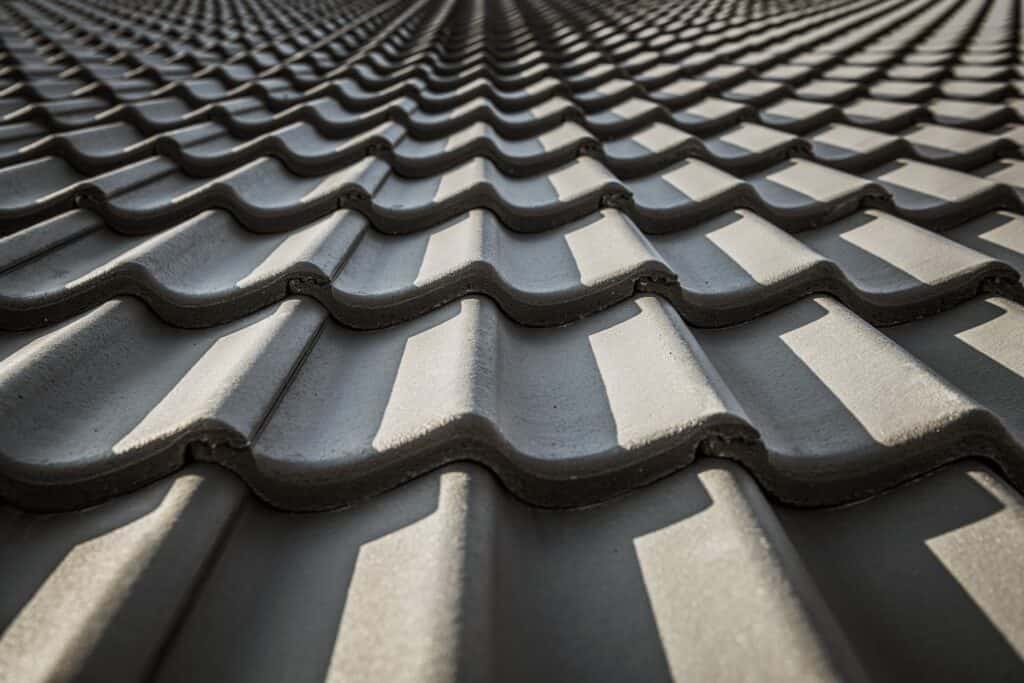
Whether you’re a homeowner looking to maximize your roof’s lifespan or a professional seeking insights, this comprehensive guide is for you. Let’s unravel the secrets to roof longevity in Florida.
Understanding Florida’s Unique Climate and Its Impact on Roofing
Florida’s climate is a significant factor in determining roof longevity.
The state’s weather conditions are unique, with high levels of sunlight, humidity, and rainfall.
These elements can have a profound impact on roofing materials. They can accelerate wear and tear, leading to a shorter roof lifespan.
Understanding these climatic factors is the first step in maximizing roof longevity in Florida.
The Relentless Florida Sun and UV Exposure
The Florida sun is a force to reckon with.
Its relentless UV radiation can degrade roofing materials over time.
This exposure can lead to discoloration, cracking, and other forms of damage.
Choosing UV-resistant roofing materials can help mitigate this effect and extend roof longevity.
Humidity, Rainfall, and Storms: The Water Factor
Florida’s high humidity and frequent rainfall pose another challenge.
These conditions can lead to moisture accumulation, promoting mold and mildew growth.
Storms, too, can cause significant roof damage.
Proper roof maintenance and the use of water-resistant materials can help combat these issues.
The Salt Air Effect: Coastal Roofing Considerations
For coastal homes, the salt air is an additional factor.
This salty environment can corrode certain roofing materials, reducing their lifespan.
Choosing corrosion-resistant materials and regular cleaning can help maintain roof longevity in these areas.
Understanding these factors is key to making informed decisions about roof care and material selection in Florida.
Roofing Materials and Their Lifespans in Florida
The choice of roofing material plays a crucial role in roof longevity.
Different materials have varying lifespans and react differently to Florida’s climate.
Here are some common roofing materials used in Florida:
- Asphalt Shingles
- Tile Roofs
- Metal Roofs
- Flat Roofs
Each of these materials has its pros and cons, affecting their longevity and suitability for Florida’s climate.
Asphalt Shingles: Affordable but Vulnerable
Asphalt shingles are a popular choice due to their affordability.
However, they are vulnerable to Florida’s harsh weather conditions, typically lasting 15-20 years.
Tile Roof Longevity: A Durable Choice
Tile roofs, particularly clay, are known for their durability.
They can last up to 50 years, making them a great choice for longevity.
Metal Roofs: Combining Longevity with Style
Metal roofs offer both longevity and style.
They can withstand Florida’s climate well and can last up to 40-70 years.
The Pros and Cons of Flat Roofing in Florida
Flat roofs are common in Florida, especially in commercial buildings.
While they offer certain advantages, their lifespan is typically shorter, around 10-20 years, due to water pooling issues.
Key Factors That Influence Roof Longevity
Several factors influence the longevity of a roof in Florida.
These include the quality of installation, regular maintenance, proper ventilation and insulation, and the color and coating of the roof.
Each of these factors plays a significant role in how long a roof can last.
Understanding these factors can help homeowners make informed decisions about their roofing choices.
Installation Quality: The Foundation of Roof Longevity
The quality of the roof installation is the foundation of its longevity.
A poorly installed roof can lead to numerous problems, reducing its lifespan significantly.
Regular Maintenance: The Lifeline of Your Roof
Regular maintenance is the lifeline of your roof.
Routine inspections and prompt repairs can prevent minor issues from becoming major problems, extending the life of your roof.
Ventilation and Insulation: Protecting Your Roof from Within
Proper ventilation and insulation can protect your roof from within.
These factors help regulate temperature and moisture levels, preventing damage and extending the roof’s lifespan.
The Role of Roof Color and Reflective Coatings
The color of your roof and the use of reflective coatings can also influence its longevity.
Lighter colors and reflective coatings can help reflect the sun’s rays, reducing heat absorption and slowing the aging process of your roof.
Roof Maintenance: Best Practices for Florida Homeowners
Maintaining your roof is crucial to its longevity.
In Florida, this involves several key practices.
These include routine inspections, dealing with debris and drainage, addressing repairs promptly, and utilizing professional roofing services.
Adhering to these practices can significantly extend the life of your roof.
Routine Inspections: Preventing Minor Issues from Becoming Major
Routine inspections are essential to prevent minor issues from becoming major problems.
These inspections can identify potential issues early, allowing for prompt repairs and preventing further damage.
Dealing with Debris and Drainage
Dealing with debris and ensuring proper drainage is also crucial.
Debris can cause damage and block drainage, leading to water accumulation and potential roof damage.
Addressing Repairs Promptly: A Proactive Approach
Addressing repairs promptly is a proactive approach to roof maintenance.
Delaying repairs can lead to more extensive damage and a shorter roof lifespan.
The Importance of Professional Roofing Services
Professional roofing services are important for maintaining your roof.
Experienced roofers have the knowledge and skills to properly inspect, maintain, and repair your roof, ensuring its longevity.
Enhancing Roof Longevity: Additional Considerations
Beyond regular maintenance, there are other factors that can enhance roof longevity.
These include the impact of technology and innovation on roofing materials, and the trend towards sustainable roofing.
- Technology and innovation have led to the development of more durable and efficient roofing materials.
- Sustainable roofing options are not only eco-friendly, but they can also be more durable and require less maintenance.
The Impact of Technology and Innovation on Roofing Materials
Technology and innovation have significantly impacted the roofing industry.
New materials and installation techniques have been developed that can extend the lifespan of a roof.
Sustainable Roofing: Eco-Friendly and Long-Lasting
Sustainable roofing options are becoming increasingly popular.
These eco-friendly options are often more durable and require less maintenance, contributing to a longer roof lifespan.
Conclusion: Maximizing Your Roof’s Life in the Sunshine State
In conclusion, roof longevity in Florida is influenced by a variety of factors.
From the type of roofing material used, the quality of installation, regular maintenance, to the impact of Florida’s unique climate, all play a significant role.
By understanding these factors and making informed decisions, homeowners can maximize the lifespan of their roofs.
Remember, a well-maintained roof not only protects your home but also enhances its value.
For professional roofing services, contact AJ Wells Roofing today or call us at 904-553-0069 to ensure your roof is in top condition and ready to withstand Florida’s climate!
